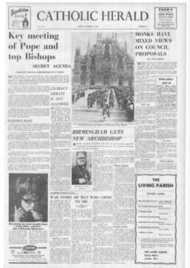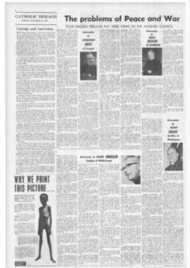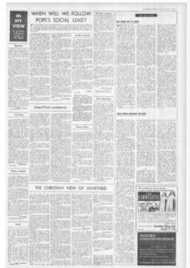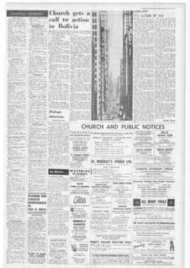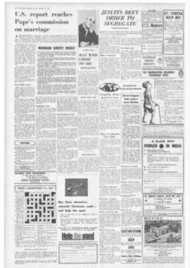Page 5, 15th October 1965
Page 5

Report an error
Noticed an error on this page?If you've noticed an error in this article please click here to report it.
Tags
Share
Related articles
Birmingham Gets New Archbishop
New Portsmouth Bishop
Dwyer Dies: Outspoken Priest Who Moved With The Times
Fond Memories Of Archbishop Dwyer
Archbishop Hume Becomes Cardinal
A traditionalist who
moves with the times
I SPOKE to Bishop Dwyer in Rome twenty minutes after receiving the news that he had been appointed Archbishop of Birmingham. He was in the English College, resting after a Council session and. as usual, was frank about his feelings.
"I will be very sad to leave Leeds", he said. "When I went there I thought I would stay for the rest of my life. The priests, the people and myself knew each other extremely ws.,11. It was like a happy family.
"It is a great honour, of course, to be appointed to Birmingham. It is a very historic diocese. I would like to ask all the people for their prayers to help me in the future".
As yet, no dates have been used for the transfer, there wilt he farewell parties in Yorkshire and welcoming celebrations in the black country and the potteries. A new Bishop will have to be found for the now vacant See of Leeds. Already, ecclesiastical wagers are being placed on a few likely men.
For months, ever since Archbishop Grimshaw died. Bishop Dwyer's name has been mentioned as a sure favourite for the archbishopric. His clergy more or less expected it.
And yet when the announcement leaked out through the country parishes there was a reaction of genuine sorrow. "The place is like a morgue all day", said a young member of the curial staff. "Everybody is really sad about his going. He was an obvious choice, I suppose. but we hoped someone else would get the job".
On first appearances, Bishop Dwyer is an ultra-traditional Catholic. His dual background of Lancastrian and Irish parents and a Rome education should have produced a conservative approach to his priestly ministry, but on the contrary Dr. Dwyer always reflects the mood of the Church and never more than at the present time of aggiornamenfo.
His openness to change is at first perceived only by those who work closest to him. It has been said that he is slow to warm to new ideas but that once he is convinced of their value he commits himself with all his force.
This characteristic was never more in evidence than at the second Vatican Council, where with his grasp of language and quick perception of theological nuances his approach to change broadened quickly once he read the mood of the Council fathers.
He is a man of diverse talents. a gifted leader and administrator, a first-class scholar and a Bishop who probably visits more sick and aged people per week than any other in the country. He is honest to the point of bluntness and usually reluctant to waste time posing at public events.
A writer himself, he treats journalists fairly but has been known to give them a severe dressing down for not interpreting him correctly in a news story. Coincidentally, his career is linked Closely with that of Cardinal Heenan. They began working together just after the war in an effort to reorganise the CathoTic Missionary Society.
Between them Fr. Heenan was superior and Fr. Dwyer editor of the Catholic Gazette—they drew up a new constitution and gave the Society its present look.
Fr. Heenan was later ap
pointed Bishop of Leeds and Fr. Dwyer became superior and directed the mission work around Britain for five years until he himself became Bishop of Leeds in 1957.
In Leeds he has made a name as a dedicated worker who was Lip every morning at 6 a.m. and working hard until midnight. He reorganised the diocese's vocations drive, built schools, threw himself into the field of youth work, the ecumenical movement, and the care of orphans.
One of the first—and. many believe, one of the most effective things—he did for the diocese. although at the time it seemed remote was to send volunteer priests to South America. He was one of the earliest Bishops in the country to acknowledge the obligation of each diocese to the whole Church.
Despite an acute shortage of vocations at the time it was an investment that came off. Owing to his introduction of new ideas to promote the recruitment of candidates for the priesthood, Leeds is now one of the best off dioceses in the country in this respect.
His main work in the diocese has been connected with schools, opening an average of two a week. And ip the next couple of years, two big teacher training colleges will be in full swing in the diocese.
As well as by building schools he has done prodigious work in the education field by sponsoring youth leadership courses with a revolutionary flavour. And in recent years he has placed more and more faith in the young men with ideas in his diocese and has often personally approved their campaigns in the face of stiff opposition.
His excellent rapport with non-Catholics over the years was highlighted with a mass attendance of over 4,000 people of all denominations at a unity meeting in Leeds town hall last January.
Prudence dictates his actions. Whatever is good for the Church is his guiding rule. His attention to detail is not caused by his desire to interfere but rather to encourage. Set in the traditional mould, he yet, because of his openness, embodies all that is essential for the Church's leadership in the contemporary world.
Donal Musgrave
He recently led the way for one of the first Catholic comprehensive schools in the country. His foresight as regards education is now bearing fruit all over the West Riding of Yorkshire. A new remand home recently opened in Scarthingwell is another of his ideas which has shown fulfilment.
blog comments powered by Disqus


